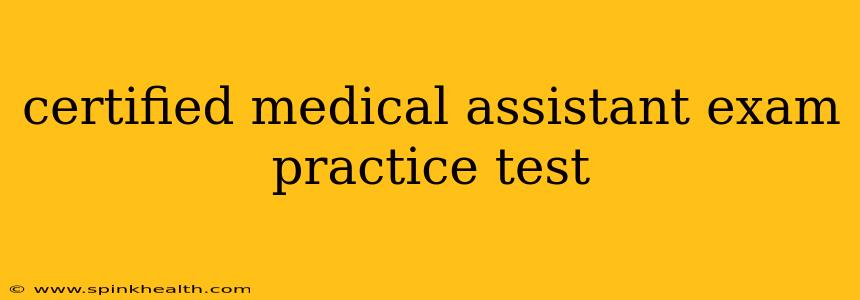The Certified Medical Assistant (CMA) exam is a significant hurdle, marking the culmination of your hard work and dedication. But don't worry, you've got this! This isn't just another practice test; it's a journey, a simulated experience designed to boost your confidence and pinpoint areas needing extra attention. Think of it as a dress rehearsal before the big show.
We'll explore various aspects of the CMA exam, tackling common question types and delving into the crucial knowledge needed to succeed. This isn't just about memorization; it's about understanding the underlying principles and applying your knowledge to real-world scenarios. Let’s begin!
What are the topics covered in the CMA exam?
The CMA exam covers a broad spectrum of medical assisting skills and knowledge. Expect questions on administrative duties, clinical procedures, and ethical considerations, all designed to assess your readiness for a dynamic healthcare environment. The specific weight given to each area can vary, so a well-rounded preparation strategy is key. This includes mastering areas like:
- Administrative tasks: Scheduling appointments, managing patient records, insurance processing, and handling correspondence.
- Clinical procedures: Vital signs measurement, electrocardiograms (ECGs), phlebotomy, injections, assisting with examinations, and sterilization techniques.
- Medical terminology: Understanding and using correct medical terminology is crucial for clear communication within the healthcare team.
- Medical law and ethics: Knowledge of HIPAA regulations, patient confidentiality, and ethical decision-making in medical situations is paramount.
What type of questions are on the CMA exam?
The CMA exam uses a variety of question types to thoroughly test your understanding. You’ll encounter multiple-choice questions, true/false questions, and potentially even some fill-in-the-blank or matching questions. These question types are designed to evaluate not only your factual knowledge but also your problem-solving skills and critical thinking abilities within a medical context. Practice with diverse question formats will prepare you for any surprises on exam day.
How many questions are on the CMA exam?
The exact number of questions can vary slightly depending on the testing format and version, but it typically falls within a range that challenges your knowledge and stamina. Expect a substantial number of questions, ensuring a comprehensive assessment of your skills. Consistent practice with a variety of question types will help you build both the knowledge and endurance needed.
How long is the CMA exam?
The duration of the CMA exam is designed to allow ample time to answer all the questions carefully and thoroughly. Time management is crucial; practice tests can help you simulate exam conditions and improve your speed and accuracy. Don’t rush; accuracy is more important than speed! Allocate your time wisely during the exam to ensure you cover all the material effectively.
What resources are available to help me study for the CMA exam?
Many excellent resources exist to help you prepare. Consider using official study guides, practice tests from reputable sources, and potentially enrolling in a comprehensive review course. Remember, a multifaceted approach to studying is often the most effective. Combine studying from multiple sources, and always use practice questions to assess your progress and identify areas needing improvement.
What is the passing score for the CMA exam?
The passing score isn't publicly released as a specific number; it’s determined based on a complex scoring system that considers various factors to ensure reliability and validity. Focus on thorough preparation rather than worrying about the exact passing score. A consistent study regimen and lots of practice will significantly boost your chances of success.
This journey to becoming a certified medical assistant is exciting and rewarding. Remember, preparation is key. Keep practicing, stay focused, and believe in yourself. You've got this!

